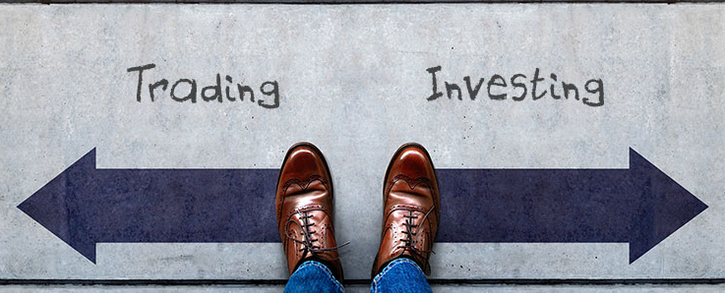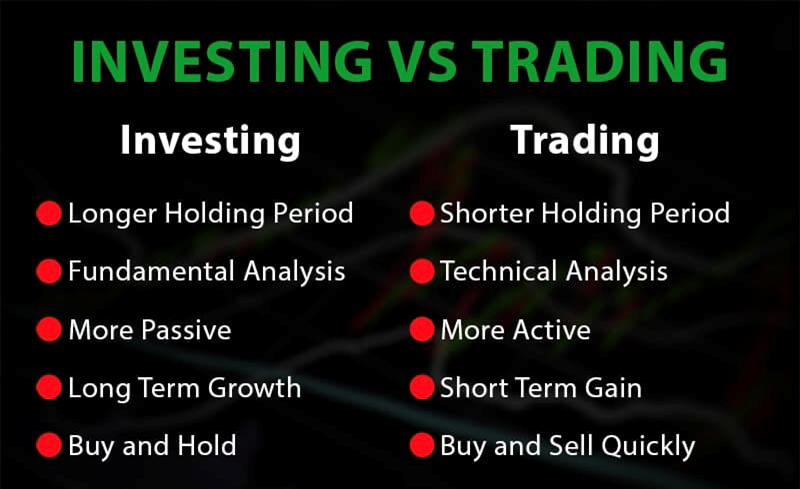
Create a free account or login to access more of investoguru.com
Create a free account or login to access more of investoguru.com
REGISTER NOW OR LOGINA wise Investor said:
The day we plant the seed is not the day we eat the fruit or enjoy the shade.
Likewise, Compounding takes its own time
A Daring Trader said:
But then Life is a probability-based game, None of us knows what the future beholds all we can do is make the decision based on the Information at the hand. It’s all about how valuable it is when you are right vs How costly it is when you are wrong.
The stock Markets is one of the most Interesting and Dynamic places which can either make us or Break us and Each one of us come to the world of stock markets to earn money but then there are many multiple ways through which help you achieve the goal. Try everything but then do what suits you, there is no one right way and what suits your character and temperament is the right way.
We can either choose the path of the Wise Investor or we can become a Daring Trader and this article is not about showing which one is better than the other rather I will try to show the positives and negatives of both the side without any biasness and let you introspect and choose the right path for yourself.


What is Investing ?
Investing involves buying and holding assets for a long period of time and the purpose behind investing is to try and typically build wealth over time, in the expectation that an asset will increase in value across years. Regardless of short-term volatility, investors will always focus on the long term view.
Investing is generally less time-intensive than trading, as you can easily delegate your investment to investment companies. Investing can be a good option if you’re after something that’s a bit more passive.
What is Trading?
In short, trading involves the short term buying and selling of financial securities. The aim behind these short and quick transactions is to try and take advantage of tiny market fluctuations. The length a trader will hold onto a particular asset varies, but traders can jump in and out of assets within weeks, days, even minutes, with the aim of short-term profits. When a trader is analysing what to trade, they’ll often focus on technical factors rather than a company’s long-term future. The most important factor for a trader is which direction a particular stock or currency pair will move next and how that move can allow the trader to profit.
In order to find out which suits us better, we will analyze them based on various factors which are important in the journey of the stock Markets.

Warren Buffett is worth about US$83 billion, who made his money off long-term investments in companies whose stocks he has held for decades. And he revealed his success story in the below words.
“I will tell you how to become rich. Close the doors. Be fearful when others are greedy. Be greedy when others are fearful.” – Warren Buffett.
Investors are in the game for a longer period and they are ready to be the part of the ups and downs of the market and they ignore the day to day volatility as noise and focus on winning the war.
Meanwhile, The traders have a philosophy that ‘’Hiroshima and Nagasaki was destroyed in a single day’’ by this they mean that the years of gains can be washed out in a single day and they try to take advantage of the mispricing’s in the markets to enter and exit positions over a short timeframe, taking smaller but more frequent profits.
Traders are in the game for a short period of time and they even square of their positions even in a few seconds and they focus on winning many multiple battles.
Investors and Traders pursue their goals in a different way. The wise Investors focus on reading about the companies Annual Reports and other Financial metrics and they basically analyze the company based on the Fundamentals of the company and they believe in the fundamentals of valuation over a long term period. Making long-term investments requires knowledge of companies’ financial essentials – like Financial Ratios, understanding Free Cash Flows, DCF valuations, relative valuation multiples like PE ratio, Price to Book Value and many more.
On a contrary to this the Traders doesn’t care about the fundamentals of the company rather they focus on the price movements by analysing the charts and they analyse the charts through various Technical indicators like RSI, Fibonacci retracement, and look for Break outs and Break downs.
One Advantage the traders have over the Investors is that the trader can make money even when the stock price is falling by shorting the stocks but the Investor can profits only when the price moves higher from his purchase price and they also enjoy the perks of Dividends and Voting rights.
Investors analyse the value and the Traders analyse the price.
Risk is like a Firewood.
If you add to much of fire then it might burn the whole house
If there is too little wood then you won’t get the required heat.
In every passage of our life, we encounter various kinds of risk and the risk is inevitable in both Trading and Investing but then the risk of the Trader is amplified by the margins that he avail from the Broker and the compulsion to square of his trade within a particular span of time. Thus they have more risks than the wise Investors.
Meanwhile, In the case of the Investors the maximum risk that he takes would the amount of money that he invested in a particular and he loses his entire money if the stock price falls to Zero and Further, the risk is mitigated by Diversifying the portfolio across various stocks or various Asset classes.
It’s true that it is the risk that makes the journey of stock markets so exciting but there are people who have lost their fortune in both trading and Investing because they risked more than what they can afford to lose, So whether you are trading or Investing always remember that ‘’Don’t try to eat more than you can chew’’.
Now lets talk about money,
Trading is more like a business, where the trader invests his capital and try to generate a positive cash flow by making profits through his given trade in a period of time. However, the motto of the investor is to invest his surplus cash, generated from where ever in the stocks for the long term. He is in no hurry to withdraw. This very divergent need, make the rules of the game different for investors and traders. Thus, the mixing of the two, makes the cash flow move in and out of markets quite frequently in the least efficient manner, thereby generating mediocre returns.
The investor apart from gaining through the price appreciation he also makes money through Dividends which are given by the company and the person has the choice to either reinvest it or not.
Investing is a passive income and the people and this is the most preferable choice for the people who are working and doesn’t have much time at disposal. All they have to do is identify a good company and invest their money or they can invest on ETF’s or any other Mutual Funds and this has been the major perks of investing as you don’t have spend your time but then the earnings takes care of itself.
Whereas, the trader has his skin in the game and he is expected to devote his quality time in developing a strategy and testing them and to follow the markets and the economy on day to day basis.S o, if you are planning to become a trader make sure that you have enough time to devote yourself to learn the Art of trading and better to avoid it if you don’t have the ability to spend time following the markets.
In India, we have two types of taxes namely, Short term capital gain tax and the long term capital gain tax. As you might know the trades which are executed within a year is classified as short term capital gain and they are taxed at 20% by the Indian Government. The Long term capital Gain was recently introduced in the 2018 budget and the these are gains made by holding on a stock for more than a year and they are taxed at 10% only if the gains exceed 1 lakh.
The dividend that the investors receive is also taxed as per the applicable slab rates of the individual.
Conclusion:
Let’s stop comparing our weakness with other’s strength and Instead, Let’s Focus on our Strengths and work on it and let’s enjoy what we do.
Warren Buffett has proved us that we can be create a huge wealth through Investing.
George Soros has proved us that we can be successful in positional trading.
Jim Simmons has proved us that we can be a billionaire through day trading.
We can become successful through both Investing and Trading but we have to choose one the one which suits you the most. So I believe that I have helped you to identify whether you are the Wise Investor or the Daring Trader. Remember that the destination might be important but then it is the journey that makes life more fascinating.
share your thoughts
Only registered users can comment. Please register to the website.